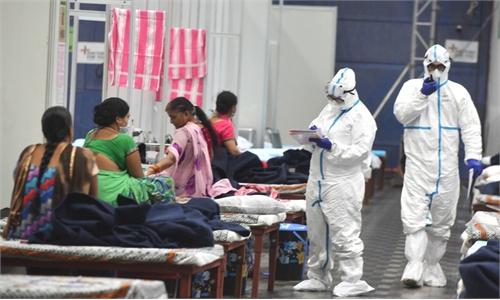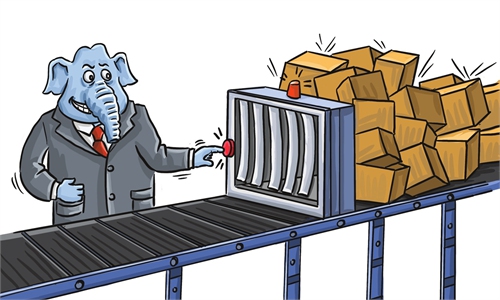
People taking holy dip at river Ganga during Kumbh festival in Haridwar, India on April 14, 2021.(Photo: Xinhua)
India's COVID-19 epidemic situation seems to have lost control. It needs to really focus on the COVID-19 fight, instead of being obsessed with geopolitical games.India on Tuesday recorded 259,170 COVID-19 cases and over 1,700 deaths, its sixth consecutive day of more than 200,000 new infections, according to CNN. Indian Chief Minister Arvind Kejriwal said on Sunday there were less than 100 ICU beds left in Delhi and there was a shortage of oxygen. On social media, many Indian people are denouncing the lack of medical resources and many posts are asking for help.
India has made its priorities wrong. Instead of focusing on epidemic prevention and control, New Delhi has been playing geopolitical games. India, as a Quad member, has been proactive in opposing China. India once bragged about its generous donation of COVID-19 vaccines, in an attempt to compete with China. Now, India is facing a vaccine shortage during the new wave.
Even following the US' steps in geopolitics, India still cannot win over Western countries' help during the COVID-19 crisis. British Prime Minister Boris Johnson on Monday canceled his visit to India, saying it was "only sensible" to do so. The UK also added India to its travel ban on Monday. India hopes that the US will soon lift the ban on the export of vaccine raw materials and the Biden administration only responded that the request was being considered. India has almost attached itself to the US chariot, and yet major Western countries have not lent New Delhi a helping hand.
India's diplomacy has been seriously affected as well. Indian Prime Minister Narendra Modi has canceled his visit to Portugal for the India-EU summit while the France visit is also likely to be rescheduled in view of the COVID-19 crisis, according to media reports.
"With such a large population, if India does not control the epidemic quickly, it may become the last country to get out of the epidemic worldwide," Lin Minwang, a professor at the Institute of International Studies at Fudan University, told the Global Times on Tuesday.
"India's COVID-19 fight is a mess and the country has not figured out the actual situation of COVID-19 infection. Rural areas and slums are ignored and have completely lost control," Lin said.
India's epidemic situation once improved. But New Delhi and people lacked enough vigilance, in addition to the large-scale gatherings and the "double mutant" variant of the coronavirus, India has failed to prevent a second wave. For example, millions of Indians traveled to celebrate Maha Kumbh Mela in April, an Indian religious festival, despite the rising COVID-19 risks. Politicians held large election rallies during the raging epidemic.
Both China and India are populous countries, but the results of their COVID-19 fight are very different. India has not only failed to learn from China's experience, but even tried to take advantage of China's COVID-19 outbreak last year. For example, some Indian hackers targeted Chinese medical institutes amid the outbreak, and some Indian media also advocated that New Delhi should support the island of Taiwan's participation in the World Health Assembly, trying to use the epidemic to split China.
India is regarded by the West as the largest democracy worldwide, with its strong ambitions of becoming a major power. But to achieve this, simply relying on geopolitical and ideological games does not help. India must actually develop its national strength and improve people's livelihood. Or India should, at least, try its best to protect people's right to life.


